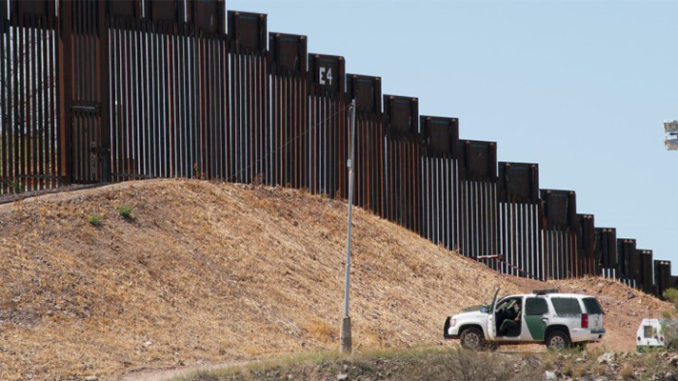
The White House released a list of immigration priorities for Congress yesterday. These ideas would render a broken immigration system even more dysfunctional, and the president’s team justifies these expensive and unnecessary proposals with distortions and falsehoods. President Trump may never have reviewed them, so we should not necessarily view these ideas as set in stone, but they do demonstrate how far certain members of the administration are willing to go to undermine the growing bipartisan consensus on allowing young undocumented immigrants to stay.
Here are some problems with the priorities:
1) Not a single pro-immigrant plank: When the White House first announced that it would put together this list, it explicitly tied it to a deal with the Democrats on DACA. Yet these new principles fail to mention anything about DACA or the Dreamers, despite President Trump’s public endorsement of legalization for them and his personal efforts to obtain a deal on the issue. Legislative DACA—which is the only humane outcome for people who are Americans in every sense that matters—would increase tax revenue, grow the economy, and lower enforcement costs. Beyond DACA, the proposals also will not fix any of the infuriating and irrational aspects of America’s legal immigration system. Indeed, it will make them all worse.
2) An expensive ugly border wall: President Trump’s top priority is the “construction of a wall along the southern border of the United States.” This gigantic expenditure of taxpayer dollars will do little, if anything, to secure the already secure border. More importantly, while the proposal will not make Mexico pay for it, it would make legal immigrants pay for it through taxes on immigration applications. Beyond being exceptionally unfair, these new taxes—which the proposal erroneously calls “processing fees”—will make legal immigration and tourism more expensive, reducing foreign investments, expenditures, and work in the United States, all of which would harm the U.S. economy.
3) Criminalizing nonviolent civil offenses: The priorities would create a new misdemeanor offense for overstaying a visa. Immigration fraud is already a crime. This would criminalize the technical violation, regardless of the reason. It would also create new criminal penalties for filing “baseless” asylum applications and increase penalties for those who recross the border after a deportation.
Bills containing theseideas are already moving through Congress. They would gut much of the progress America has made on criminal justice reform over the last decade, finally decreasing the federal and state prison populations for the first time in decades. Immigration offenses already make up half of all federal criminal arrests. At any particular time, the federal government has 23,000 immigrants incarcerated for immigration offenses. The priorities would also allow state and local governments to pass their own enforcement laws, which—if they included criminal penalties under state law—would vastly expand America’s capacity to pointlessly lock up immigrants for these offenses. This idea could be what the drug war once was to America’s over-incarceration problem.
4) Penalties for visa overstays that will backfire: The priorities would bar all visa overstays from any immigration benefits for a certain period. Immigration law already does this for those who overstay their visas and then leave the country. In such cases, immigrants cannot apply for a visa to return for three years if they overstayed for 180 days or ten years if they overstayed for a year, and so are known as the three and ten-year bars. Those who cross the border illegally cannot apply for any benefits in the United States and are subject to the same restrictions if they leave. Rather than encourage lawful behavior, these laws backfired after Congress imposed them in 1996. When people broke the law, they didn’t seek to correct their mistakes because the law prohibited them from doing so. Instead, they stayed illegally. The likelihood of a new unauthorized immigrant leaving within one year after an initial trip to the United States dropped from about 50 percent in 1996 to about zero in 2008.
5) “Merit-based” immigration that doesn’t reward merit and punishes immigrant families and refugees: Congress should allow more high-skilled immigration, but the White House describes the following reforms as rewarding merit: reducing the number of refugees; eliminating the ability of U.S. citizens to sponsor parents, adult children, or siblings; and eliminating the diversity visa lottery. None of these proposals actually help skilled immigrants, whom America treats terribly.
Moreover, they do not propose increasing the availability of visas for high-skilled immigration. Instead, they propose—like the White House-endorsed RAISE Act—to replace the existing employer-sponsored visas with a “points system.” In other words, it would not increase skilled immigration. The “replacement” aspect of the RAISE Act would throw hundreds of thousands of skilled immigrants who have waited for many years out of line and require them to reapply under its nonsensical point system. Because many of the family-sponsored immigrants are skilled, the administration priorities would have enormously negative fiscal and economic impacts.
6) Unnecessarily cruel asylum policies: The administration proposes increasing the threshold even to simply apply for asylum. I have written before about Republican efforts to impose a high evidentiary standard for asylum seekers at the border or ports of entry. The administration blames America’s generous asylum system for a surge in asylum cases (rather than violence abroad and a worldwide refugee crisis). Yet in 1996, Congress adopted a much less harsh policy in response to a similar surge of asylum seekers, requiring them to state a plausible claim of asylum and then giving them time to gather evidence and prove their claims. This system weeded out people who obviously were not asylum seekers without risking turning back people to violence and persecution. Now the administration wants people to have to prove their claims before they even apply, and as soon as they arrive. This is simply impossible for people fleeing for their lives.
7) E-Verify’s electronic national ID system: E-Verify is the federal government’s attempt at a card-less national identification system. Some employers currently use it either voluntarily or under threat of sanction under state law to screen employees against federal databases for immigration status. But it contains no restrictions on its use and could be used to screen Americans participating in almost any activity. Gun sales seem like a likely target given that the law already prohibits unauthorized immigrants from possessing a firearm, but once it is mandated for gun sales, the argument against its use for housing, bank accounts, DMVs, etc. diminishes greatly and a comprehensive system of surveillance and government pre-approval is likely.
Other problems with E-Verify abound. System errors already have delayed or cost a half a million jobs for legal workers since 2006, and over the next decade, would delay or cost another 1.7 million jobs. Mandatory E-Verify would be one of the largest labor market regulations in the history of the United States, applying to every employer and worker in the United States. It would increase the costs to hiring and so lower overall employment at the margins. It has not been shown to decrease unemployment or reduce the incentive to immigrate illegally.
So many other aspects of the priorities deserve mention. Combining various proposals, the administration wants to 1) create a deportation force to round up large numbers of immigrants, 2) place these immigrants in expensive detention centers and deport them 3) without any due process to 4) countries where they are not even nationals. It wants the ability to deport legal immigrants whose convictions were vacated or who were never even convicted of a crime. It wants to deport unaccompanied child border crossers without a court hearing to countries where their parents may not even live.
All of these ideas are expensive and unnecessary. Illegal immigration has fallen to a trickle and increases in legal immigration would eliminate the remaining flow. These ideas would make nearly every portion of America’s immigration system less rational, less humane, and more costly. Congress should not even debate them and move immediately to consider real proposals to fix the system.
David J. Bier is an immigration policy analyst at the Cato Institute’s Center for Global Liberty and Prosperity.



